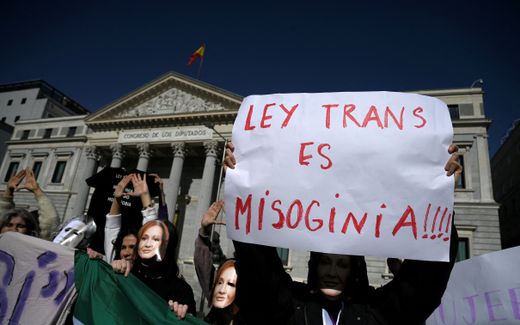Spain withdraws controversial rape law

A person holds a banner that reads 'Only Yes Means Yes' during a rally on the occasion of the International Women's Day in Seville, Spain. Photo EPA, Raul Caro
Southern Europe
The Spanish government withdraws a controversial rape law only six months after its implementation. The minister's defence of the legislation was in vain. "Only yes means yes" will be declared null and void again.
An overwhelming majority of the Spanish Parliament wiped the new law off the table, Neue Zürcher Zeitung reports. The Social Democrats and the Conservatives had agreed to support each other in rejecting the rape law implemented at the end of last year. In total, 233 MPs voted in favour of rejection, 59 against and four abstained. Responsible minister Irene Montero calls it the 'saddest day', El Mundo writes.
Higher sentences
There has been upheaval about the "Only yes means yes" law for weeks already among politicians and the general public. Equality Minister Irene Montero introduced the legislation to protect women better. With it, she wanted to make it easier for women to report rape and punish gang rapists with higher sentences.
For example, the law reversed the burden of proof. No longer did women have to show bodily injuries to prove they were raped. Instead, potential perpetrators had to show that women explicitly consented to sexual acts to prove their innocence. Any act that women did not expressly approve of was to be considered rape. Until the law came into force, these acts were classified as abuse, leading to lower penalties.
Sexual aggression
However, sentences for non-violent sexual offences were reduced by the new law. Offenders received a reduction of two years of imprisonment. In practice, that meant about 100 rapists were immediately released because they had already served their sentences. In 880 other cases, sexual offenders also received a reduction of their sentence.

This led to much upheaval in Spanish society. Prime Minister Sánchez even apologised to abuse victims whose perpetrator was released. He promised adjustments to the law.
Sánchez wanted a renewed differentiation between abuse and sexual aggression. He also promised that prison sentences would be longer for physical violence.
Burden of proof
However, Equality Minister disagreed with the amendments. During the debate on Thursday, she fiercely defended the "Only yes means yes" law. She argued that changing the law would again leave women in the cold by putting the burden of proof on them again. Also, she firmly believes that legislation should focus more on consent than on bodily injuries. However, her plea was in vain.
Related Articles






